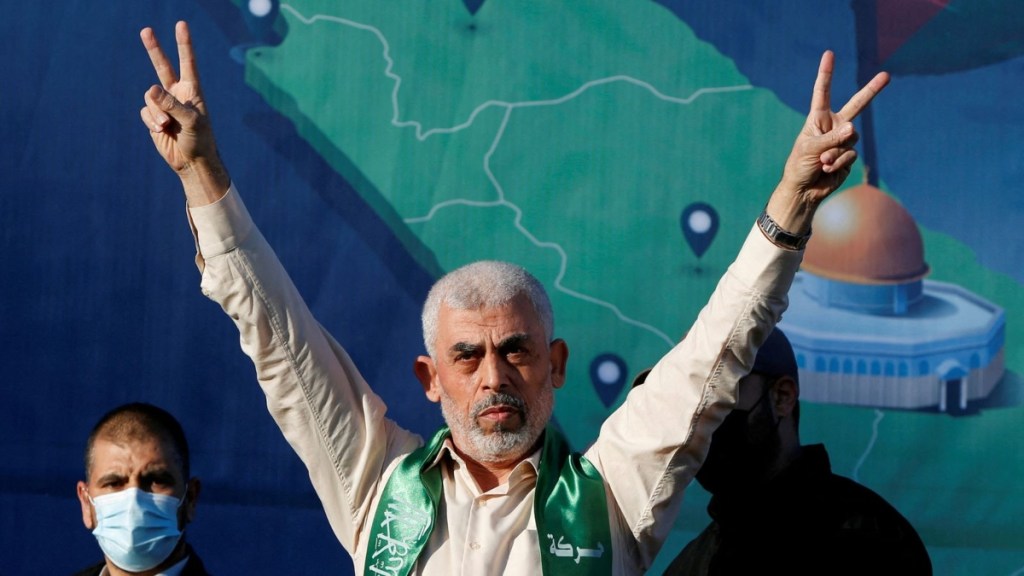Hamas Chief Yahya Sinwar and three other militants were killed in a targeted group operation in Rafah in southern Gaza by the Israel Defence Forces (IDF) on Thursday (October 17). Post his death, his identity was confirmed with the help of a DNA test. The sample used for the test was from when he was imprisoned in Israel.
Seen as the mastermind of the October 7 attack in Israel last year, Sinwar was referred to as “a dead man walking” by Israel. The attack had seen 1,200 people die and over 150 Israelis being captured.
It is now believed that the attack was planned as early as December 2022, when Sinwar, during a rally in Gaza, vowed to bombard Israel with “endless rockets” and unleash “a limitless flood of soldiers.”
Who was Hamas chief Yahya Sinwar?
Born in a refugee camp in southern Gaza in 1962, Yahya Sinwar’s parents were among those expelled from Ashkelon by Zionist forces during the 1948 Palestinian Nakba. At the time of his birth, the region was under Egyptian control.
In the early 1980s, while studying at the Islamic University in Gaza, Sinwar was involved in the Muslim Brotherhood and was arrested for protesting Israeli occupation. He is credited with establishing Hamas’s Internal Security Force, Al Majd, which handled internal security, investigated suspected Israeli agents and Palestinian collaborators, and allegedly carried out brutal eliminations of those believed to be working with Israeli intelligence.
He also holds the credit for founding the al-Qassam Brigaded, Hamas’ military wing, and the largest militia operating in Gaza prior to last year’s October 7 attacks.
In 1988, Sinwar was arrested by Israeli authorities for the killing of 12 Palestinians accused of collaborating with Israel, earning him the nickname ‘Butcher of Khan Younis.’ He was also implicated in plotting the abduction and murder of two Israeli soldiers.
After spending 22 years in Israeli prisons, he was released in 2011 as part of a large-scale prisoner exchange deal. Sinwar rejoined Hamas, steadily rising through its ranks, and in 2017 succeeded Ismail Haniyeh as the leader of Hamas in Gaza. In August of this year, he was appointed head of Hamas’s Politburo following Haniyeh’s death in a targeted missile strike in Iran the previous month.
Last month, Israel’s ally, the US, formally charged Sinwar and other Hamas leaders with “financing, directing, and overseeing a decades-long campaign to murder American citizens and endanger the national security of the United States”.
What does Sinwar’s death mean?
Giving a big blow to Hamas, Sinwar’s death also opens little possibilty of ending the Palestine war. Killing Sinwar is a major milestone for Israel. While it is uncertain how Hamas and the Palestinians will respond to this loss, for the US and other allies of Israel, it presents a chance to de-escalate tensions in Israel. It also offers the Israeli government a potential exit from a conflict that has claimed thousands of lives, cost billions of dollars, and plunged the world into a prolonged political and moral crisis.
“His removal from the battlefield does present an opportunity to find a way forward that gets the hostages home, brings the war to an end and brings us to a day after,” US National Security Adviser Jake Sullivan said after learning about Sinwar’s death.
US President Joe Biden congratulated Prime Minister Benjamin Netanyahu on taking out Sinwar, as per CNN. He firmly stated that Sinwar’s death should unequivocally signal an end to the war.
“I told him that we were pleased with his actions, and further that, now is the time to move on,” Biden told reporters. “Move on, move toward a ceasefire in Gaza, make sure we’re moving in a direction that we’re going to be in a position to make things better for the whole world.”
While Israel’s allies see some hope in Sinwar’s death, there is no certainty that this will happen. In fact, tensions could potentially escalate further, depending on Israel’s next moves.

